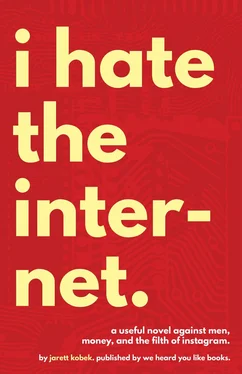Eric Schmidt, who Brin and Page made CEO of Google long enough to shepherd the company through its initial public offering, was like Zeus, the king of the gods. Eric Schmidt was the man behind the scenes, the unmoved mover, the guy who made deals with the government and the CIA and the NSA, the guy who worked on various Presidential commissions and had a hand in the company’s Washington dealings. He loved that Google afforded him proximity to power. Like Zeus, he was weird and mysterious in a way that the others weren’t. He was always there but you never knew what he was really like. And let’s not get into his complicated romantic life, the servicing of which required a fuckpad on Manhattan island.
Susan Wojcicki was the sister of Anne Wojcicki, the wife of Sergey Brin, and she was the Senior Vice President of Advertising. She was like Demeter, the goddess of the harvest and the growing earth. It was Susan Wojcicki who let Sergey Brin and Larry Page start Google in her garage, and it was Susan Wojcicki who really ran the show, overseeing the advertising which was the source of all the money. Susan Wojcicki had wanted to be an artist and Susan Wojcicki was even more mysterious than Eric Schmidt. No one knew much about her, which reminded Christine of the Eleusinian Mysteries, shrouded in darkness.
And there was good ol’ Steve Jobs, better known as Hades. And not just because he was dead and rotting in the dank recesses of the netherworld, doomed for an uncertain term to watch projected images of impoverished factories workers on the rocky walls of oblivion. Basically, Steve Jobs was Hades because Hades was a total unyielding dick. The defining aspect of Steve Jobs was the marriage of his innate dickishness with gauzy Bay Area entitlement. This blessed union birthed a blanket of darkness which settled over the Western world. Steve Jobs grew up reading The Whole Earth Catalog, a publication dedicated to the proposition that by spending your money in the right way , you could become the right kind of person. This was the mantra of the post-WWII economy, an unspoken ideology that cut across the social classes. But because The Whole Earth Catalog emerged from the Bay Area after the death of several utopian ideals, the stench of its message was masked by patchouli, incense and paperback editions of gruel-thin Eastern spirituality. It was a new kind of marketing, geared towards the insecure bourgeois aspirant. Steve Jobs sucked it in and shit it out and transformed himself into Hades. The one god that can’t be escaped. His promise was simple: you have a choice. You can die ugly and unloved, or you can buy an overpriced computer or iPod and listen to early Bob Dylan and spin yourself off the wheel of Samsara. Your fundamental uncreativity will be masked by group membership. People will think you are interesting and beautiful and enlightened. One of us, one of us, one of us. Gooble gobble, gooble gobble. Nothing says individuality like 500 million consumer electronics built by slaves. Welcome to Hell.
Then there were the minor divinities.
Like Sheryl Sandberg, the billionaire who worked for Facebook and thought that the way women who weren’t billionaires could get respect in the workplace was to act more like the men that disrespected them in the workplace. Before she was at Facebook, she was at Google, and Christine decided that Sheryl Sandberg was like Iris, the messenger of the Gods. It seemed like Sheryl Sandberg had spent her whole professional life doing nothing but delivering messages.
Like Ray Kurzweil, who Christine identified with Dolos, the Greek spirit of trickery and guile. Ray Kurzweil was the king of technological liberation theology. Or, in other words, he was king of the most intolerable of all intolerable bullshit. He believed in a future where computers would reach a moment of technological singularity. The technological singularity was a bullshit phrase invented by the Science Fiction writer Vernor Vinge. The technological singularity was the name for a theoretical moment in the future when computers would achieve a critical mass of artificial intelligence and wake up and change everything. The way that computers would change everything is by emerging into consciousness and telling people like Ray Kurzweil and Vernor Vinge that they were fucking awesome. The computers and Ray Kurzweil and Vernor Vinge would hang out and kick back and rule the universe forever. This is not an exaggeration. This is what Ray Kurzweil believed. This bullshit was reported by major American media outlets. This bullshit was taken as gospel by cub reporters who did not understand regular old intelligence, let alone intelligence crafted by man. So Ray Kurzweil was the god of lies. Who would deny the puissance of a man who thought that his computer was going to wake up and hang out with him and tell him he was awesome? Everyone in Silicon Valley loved Ray Kurzweil. He was their High Priest of Intolerable Bullshit. He was the Seer of Pseudoscience. He worked for Google. He was a director of engineering.
Like Marissa Mayer, who Christine identified with Elpis, the Greek goddess of hope. There was no way you could be Marissa Mayer without hope. When she worked at Google, she had at some point dated Larry Page while helping out on all kinds of projects that went nowhere, like Google Books, which she called, “Google’s Moon Shot.” Google Books was Google’s attempt to steal the intellectual property of every writer in America by offering free copies of their work in an unusable system. Mayer had parlayed her experience with the unusable system of Google Books into being CEO and President of Yahoo! which was a company that offered products which no one used. Yahoo! was a relic of the first tech boom. No one understood why Yahoo! still existed or what Marissa Mayer did at Yahoo! Yet there she was, making terrible billion dollar acquisitions and redesigning logos. There was no way you could be Marissa Mayer and not have any hope.
None of these divinities had any eumelanin in the basale strata of their epidermises.
The most visible thing that Marissa Mayer did when she worked for Google was interview Lady Gaga for Musicians@Google.
Musicians@Google was part of the larger Talks@Google series.
Both Musicians@Google and Talks@Google were public presentations held in Google’s various offices around the world.
The event with Lady Gaga was hosted at Google’s headquarters. This was in Mountain View, California. Mountain View was part of Silicon Valley.
It was about forty minutes south of the city, depending on traffic. This is where the Google buses went.
Google was known for distributing t-shirts amongst it employees. These t-shirts were made for software milestones, company events and any other thing that struck the fancy of the company’s emotionally bankrupt middle management.
Google made t-shirts for the Lady Gaga event. They read: GOOGLE GOES GAGA.
Marissa Mayer asked Lady Gaga questions like: “And also on the topic of style, you have tattoos. And one of the fans noticed that they’re all on your left side. So TaylorMonster15 would like to know, why are all of your tattoos on the left side of your body?”
“What’s remarkable,” said Adeline, “is that this ain’t no gag. Christine prays to each of these gods in her various times of need.”
“I believe it,” said J. Karacehennem.
“How does one pray to the living?” asked Adeline, “What happens if you meet Larry Page?”
“The Greeks thought that the gods were living beings,” said Christine. “Who personified certain aspects of existence. The Greeks also ran the risk of running into their gods. There’s no difference.”
“These aren’t gods. These are dreary little people who’ve spent their lives advertising insurance.”
Читать дальше












